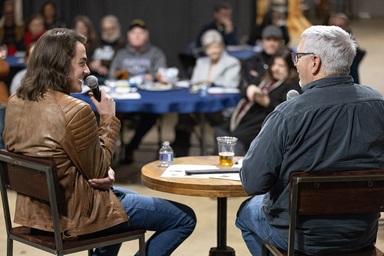Key Points:
- Being helpful in the middle of a war is a tricky business, but it’s the role that the Rev. Fred Vanderwerf is taking on as coordinator for In Mission Together: Ukraine.
- Bishop Christian Alsted, who leads the Nordic-Baltic-Ukraine Episcopal Area, says Ukrainians are suffering terribly because of the invasion by Russia.
- Vanderwerf has already reached out to prominent churches such as Resurrection, a United Methodist Church in Leawood, Kansas, for support.
Ukrainians don’t talk about if they win the war with Russia. They talk about when they defeat the invaders.
“There’s a great deal of certainty,” said the Rev. Fred Vanderwerf, who will be engaging with Ukraine on behalf The United Methodist Church. “I’ve been working hard to see how and where I can help.”
Vanderwerf began work July 1 as coordinator of In Mission Together: Ukraine, which facilitates mission partnerships with churches under the United Methodist Board of Global Ministries. One of his priorities is planting churches in the midst of the crisis.
It’s not as outlandish as it may seem to view the war as an opportunity for church planting, said Vanderwerf, who is also an assistant to Bishop Lanette Plambeck in the Minnesota Conference.
“All of our churches should be equipped for church planting,” he said. “Oftentimes the church grows and flourishes at its greatest in the midst of trauma, conflict and flight. The early church did it that way.”

Vanderwerf said he is excited to return to work in Ukraine, where he and his wife served as missionaries from 2000 to 2008.
“There’s so few United Methodists in the world that have the relationships I have over there and speak Ukrainian,” said Vanderwerf. He succeeds the Rev. Mel Munchinsky, who worked with all of Eurasia before the war caused a split between Russia and Ukraine.
Bishop Christian Alsted, who leads the Nordic-Baltic-Ukraine Episcopal Area, said the suffering in Ukraine is profound.
More about church and Ukraine
Russia invaded Ukraine in February 2022, citing its concern that Ukraine would join NATO, the alliance of European and North American nations working to preserve peace in the North Atlantic. Many Ukraine residents have fled the country and thousands have perished on both sides.
“Our sisters and brothers in Ukraine are daily suffering from the fear, violence, death and destruction caused by an unjust and meaningless attack on their country,” Alsted said. “They hear the daily news of new attacks and new death. They live with the fear, the anger and the frustration.”
Vanderwerf plans to travel to Ukraine twice a year — the first time a three-week stay this fall.
“Most of it’ll be just initially reacquainting myself on what’s going on and what are the needs,” he said. “They would also like help connecting with the diaspora churches, the small groups that have moved to other parts of central and western Europe that are still gathering and worshipping. … I would like to help connect those groups so they remain part of some greater connection and they can be equipped and trained to continue to reach people for Jesus in the context that they’re in, or be ready to return and do the same.”
Vanderwerf is considering starting a video or podcast series to keep people apprised of what’s happening with Ukraine.
“Just weekly or monthly updates about what’s going on and how they can help,” he said. “Because communication has been strained, just due to trying to live life in a war.”

What isn’t needed now is a large contingent of volunteers traveling to Ukraine, said Munchinsky, who said the job was one of the hardest he’s ever attempted.
“One of the problems of sending people over there is that they take up the resources that are needed by refugees and other people,” he said. “I know people’s hearts are definitely in the right place, but the thing is that sometimes helping can be a problem.”
On Munchinsky’s watch, funds were raised to buy two vans to transport refugees out of the country and also help move people around Western Ukraine as needed.
“I discovered all kinds of different possibilities came my way that weren’t part of the job description,” he said. “For example, helping with trading, being involved in orphanage outreach, things like that.
Subscribe to our
e-newsletter
“I constantly was talking to someone and trying to figure out ways to help.”
United Methodists have responded well to the challenges brought on by the war, Alsted said.
“Almost all churches in Ukraine offer shelter for fellow citizens,” he said. “In addition, the church runs a large shelter in Uzhhorod with approximately 70 persons. With support from (the United Methodist Committee on Relief), we are planning to acquire a larger and better facility for long-term accommodation for 40-50 persons, where we will offer support for persons suffering from post-traumatic stress disorder.”
Vanderwerf has already reached out to churches such as Resurrection, a United Methodist Church in Leawood, Kansas, a prominent faith community pastored by the Rev. Adam Hamilton.
“They’re ready to engage and do something,” he said. “I just spoke with (Grey Eagle United Methodist Church) in Minnesota. They just welcomed Ukrainian refugees into their town, invited them to church and showered them with housewarming gifts.
“Everybody is wanting to know how they can help. It’s just a matter of helping direct them to the right possible sources. So that’s where I hope to be helpful.”
Patterson is a UM News reporter in Nashville, Tennessee. Contact him at 615-742-5470 or [email protected]. To read more United Methodist news, subscribe to the free Daily or Weekly Digests.




